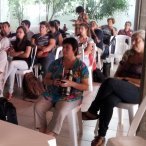English · Español

18 de marzo de 2015 | Entrevistas | Agua | Anti-neoliberalismo
Interview with Ana Dominguez, PhD: a comprehensive overview
Descargar: MP3 (2 MB)
In Uruguay “we have the need to think about our limitations, but also our potential in order to move towards territorial sustainability in the framework of the Regional Water Resources Councils and Basin Commissions”, said Ana Dominguez, PhD in Geography, in an interview with Real World Radio.
“We need to visualize the problems, but also move forward to see that as a country we have the freedom to take on responsibilities in a participatory way” and “to reverse unsustainable processes in the territories”, she added.
The Regional Water Resources Councils and Basin Commissions were created with the Constitutional Reform of 2004 to enable the participation of citizens in water management at national level.
Dominguez is a professor at the Science School of the University of the Republic and is a collaborator of the Sustainable Uruguay Program, one of the organizers of the workshop titled “Human Right to Water and Territorial Sustainability”, held on March 12 in Florida, Uruguay. The other organizers were REDES – Friends of the Earth Uruguay and the Network of Rural Women of Uruguay, with the support of foundations France Libertés, Heinrich Boll and Siemenpuu.
It was during this workshop that Real World Radio interviewed Dominguez. The Professor highlighted one of the issues discussed by Marcel Achkar, PhD in Agronomy, who was in charge of making the main presentation at the activity and said that the threats against basins in Uruguay are reversible. However, “we need to remain alert” so as to not go beyond “nature´s buffering capacity”, said Dominguez.
According to the expert, the Uruguayan people are becoming more and more aware of the need to participate with information. She also talked the need for peoples to “reclaim natural resources”, in response to an “unprecedented process of commodification and privatization of nature”. In this way, she also highlighted the importance of working together with the government.
Dominguez also made reference to the Santa Lucia River Basin, which supplies over 60 per cent of the Uruguayan population and has a “large diversity of uses” and is facing some pressure. Along these lines, she talked about the advance of soy crops, the use of agrotoxics, pollution produced by livestock farms and feedlots which “needed to be regulated”. Today there are limitations to the establishment of new feedlots in this area.
Dominguez believes we need to advance towards the creation of the National Water Resources Plan and highlighted the need of civil society considering basins as “units of life and production” in addition to “management units”. “Quality territories on quality basins produce quality water”, she concluded.
Imagen: Radio Mundo Real








